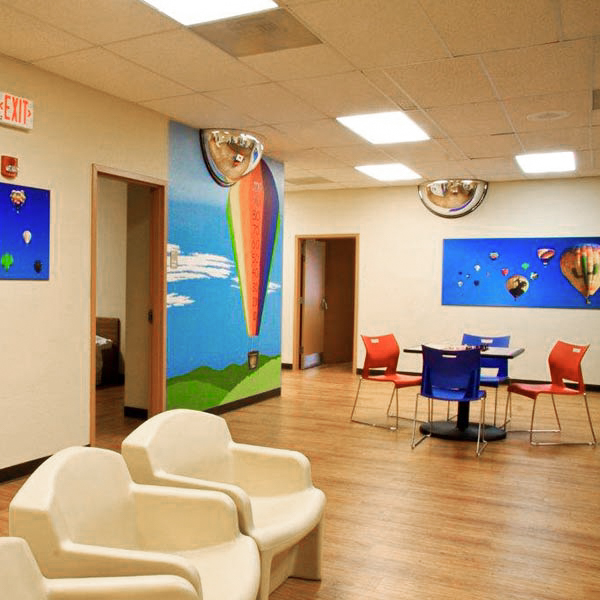Sonora Behavioral Health Hospital is dedicated to providing superior treatment to children, teens, and adults suffering from self-harm. Located in Tucson, Sonora provides the comprehensive care needed to successfully manage mental health disorders and lead a life of recovery.
Treatment for Self-Harm
Learn More About Treatment for Self-Harm
When a person is unable to cope with stress and resorts to deliberately causing physical harm and injury to him or herself, it is known as self-harm. Self-harm or self-injury often indicates that an individual is suffering from a mental health condition. Those that self-injure often do so as a means of gaining control over emotional pain or to provide relief from overwhelming emotional tension. Many people think that causing harm to oneself is a way to get attention or a means of attempting suicide. However, noticing that a person is cutting, burning, pinching, tearing his or her skin, not allowing wounds to heal, biting, pulling out his or her own hair, punching him or herself, hitting him or herself with a blunt object, or deliberately running into something, should serve as a red flag that there are deeper issues going on within the individual. Fortunately, there is help out there for those who are self-harming and struggling with intense emotional pain.
Sonora Behavioral Health Hospital, a 140-bed acute inpatient psychiatric hospital in Tucson, is a premier provider of treatment for those suffering from self-harm and self-injury. We acknowledge the unique needs of patients who are struggling with mental health concerns and diligently work with patients and their families in working towards recovery. With treatment that is designed to address every aspect of mental health conditions, like self-harming behaviors, the caring staff at our treatment center implements treatment modalities and techniques geared towards alleviating distressing symptoms, eliminating unhealthy behaviors, and restoring healthy functioning.
Helping a Loved One
Helping a Loved One or Family Member Get Treatment
Because individuals who self-harm work to conceal their behavior, it can sometimes be difficult to know whether or not someone is engaging in these risky acts. Here are some hints that could infer that a person is self-injuring or self-harming:
- Presence of injuries related to unexplainable accidents
- Decreased interest or withdrawal from things or activities that were once enjoyed
- Expressions of low self-esteem or self-deprecation
- Presence of cuts, scrapes, burns, or other wounds
- Patches of missing hair
- Wearing long sleeves or pants when it is warm outside
- Increased drug and/or alcohol use
If you have noticed any of the above in your friend or loved one, it is important that he or she seek help at a self-harm treatment center so as to prevent long-lasting or life-ending consequences. Keeping in mind that your friend or loved one may be on the defense about his or her self-injury, it is important to express your concern and provide empathetic support as you discuss this issue. Additionally, educating yourself on self-harm and possible treatment options can aid you in being able to provide the support your friend or loved one so desperately needs.
Why Choose Us
Why Consider Treatment at Sonora Behavioral Health
Prolonged self-harm can lead to a number of damaging effects for an individual if treatment is not sought to cease these behaviors. In addition to strained relationships with people in the person’s life, and the increased risk of substance abuse, the health risks associated with self-injury can be devastating. With death being the most severe of these consequences, those that self-harm may experience negative effects such as permanent damage to tissues, infection, damage to vital organs, and the possibility of multi-organ failure. Seeking help in understanding the underlying issues that have led the person to self-harm is crucial in reducing these risks.
The inpatient care at our psychiatric hospital is an excellent treatment option for someone who is self-harming. Not only does the treatment at our center provide a safe and secure environment for an individual, but it is also free from the stress of everyday life so that a person can focus on recovery. Furthermore, our inpatient treatment is monitored 24 hours a day by trained medical staff and mental health professionals so as to ensure that a person will not continue to self-harm while in treatment. Proven therapeutic techniques and evidence-based interventions are utilized in our inpatient care so that individuals are able to gain a better understanding about self-harm and the possible reasons that led him or her to self-injure. Lastly, our treatment is proven to be effective in helping people refrain from self-harming behaviors and develop coping skills that help an individual long after discharge.
Philosophy & Benefits
Self-Harm Treatment Philosophy and Benefits
As the leading psychiatric hospital in Tucson, we make it our mission to provide behavioral healthcare services that meet the needs of every patient requiring care. We employ proven and evidence-based treatment modalities and techniques that teach effective coping skills that can be used for a lifetime. Our experienced and qualified staff diligently work to provide comprehensive medical and psychiatric assessments, diagnostic services, and treatment. By treating acute illnesses in a sensitive and caring manner, Sonora’s staff is able to assist patients in regaining and maintaining their highest level of functioning.
Types of Treatment
Types of Treatment Offered at Sonora Behavioral Health Hospital
Upon arrival at our treatment center, each patient will complete an initial assessment that will include a physical examination, collection of medical history, a psychiatric evaluation, and a psychological assessment. During this time, we will also identify social skills, cultural and family issues, and determine any other needs that each patient may have. We use a multidisciplinary approach with each patient and our psychiatric clinical team is composed of psychiatrists, psychiatric nurses, social workers, therapists, internists, and expressive art therapists who are all trained and experienced in treating individuals with emotional health and substance abuse issues. All treatment plans are individualized and include the following methods:
Medication management: Some people require medication to alleviate symptoms of mental health conditions. When pharmaceutical intervention meets the needs of a patient, our medical staff, including nurses and psychiatrists, will work with the individual in exploring this option for treatment. Furthermore, individuals prescribed medication are monitored so as to ensure that proper medication is being administered to alleviate distressing symptoms.
Group therapy: At our psychiatric hospital, our main form of treatment is daily group therapy sessions. We use solution-focused groups that teach patients a variety of skills needed to recover from mental illnesses that can cause a person to self-harm. Some of our group topics include sleep, hygiene, coping skills, stress management, self-awareness, relaxation, and self-help skills training.
Family meetings: Family members are involved in all aspects of the treatment process and receive education about their loved one’s condition. In addition, family members are in constant communication with case managers throughout their loved one’s stay.
Additional treatment methods may include the following:
- Weekly dietary groups
- Recreation therapy
- Expressive therapy, including art therapy
- Daily meetings with social worker
Continuing Care
Continuing Care and Levels of Treatment
The discharge planning process begins as soon as a patient is admitted to our hospital. Within 48 hours of admission, a social worker will evaluate each patient for available resources in Tucson or elsewhere that can be implemented once he or she has left our center, including placement, transportation, and aftercare treatment. When the time comes for the patient to be discharged, the social worker will coordinate placement with the patient, the patient’s family members, any outside community agencies, or private insurance. If needed, social workers will also coordinate transportation from the hospital to the patient’s next placement on the day of discharge, as well as ensure that transportation needs for aftercare treatment appointments are met.
For adult patients that no longer require the intensive level of psychiatric care provided by inpatient treatment, Sonora Behavioral Health Hospital offers outpatient treatment that consist of nine to twelve hours of group therapy each week. These groups allow participants to process real-life scenarios as they happen, while also receiving the support they need as they practice the new techniques that they are learning. This eight to twelve week period of intensive treatment gives participants the chance to use a group setting to work through the emotional and psychological issues that have kept them locked in a state of distress. Through our outpatient programs, patients will learn techniques that they can continue to use for the rest of their lives.
Our partial hospitalization program (PHP) and our intensive outpatient program (IOP) allow patients to live at home, attend school, or go back to work while still receiving the treatment that they need. PHP is held 5 days a week for 6 hours each day, while IOP is held 3 days a week for 3 hours each day. Both programs have a mental health and chemical dependency track. In addition to PHP and IOP, we have an aftercare program for alumni that is held once a month for as long as patients need.
Sonora Admissions Inquiry
If you are unable to call Sonora Behavioral Health Hospital, please use the form below to submit a confidential message to our admissions staff. We will get back with you as soon as possible.














